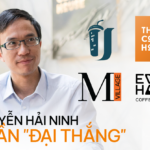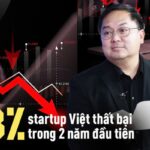
A Vietnamese startup showcases its robots at an exhibition. High-tech industries often have many “non-financial” contributing members when establishing enterprises. Illustration photo: Ricky Ho |
In the reality of entrepreneurship and business, there are countless stories of “co-founders” starting their ventures with empty pockets, yet contributing their effort, intellect, and network – forming the soul of an enterprise.
However, when the company takes shape, develops, or successfully raises capital, those who contribute these “intangible assets” are often excluded from ownership due to “not contributing valid capital.” This raises the question: Should and could the law recognize effort, reputation, and personal connections as a form of valid capital contribution?
The Enterprise Law confines the concept of assets
The “founder” model in today’s startup ecosystem is diverse: some contribute initial capital, while others bring technology, market connections, industry reputation, or execution team. Among these, “effort, reputation, and network” become decisive factors, especially in the early stages of fundraising through pre-seed and seed funding rounds.
However, when it comes to fundraising, sharing equity, dissolution, or disputes, the group contributing “non-financial capital” often finds themselves in a weak position as they are not legally recognized as “capital contributors” if they don’t own specific assets.
The 2020 Enterprise Law has strict provisions regarding the forms of capital contribution: money, gold, land-use rights, intellectual property rights, technology, technical secrets, and assets “that can be valued in Vietnamese Dong.” It is evident that this framework heavily favors tangible assets or, at the very least, legal assets with clearly established ownership.
Similarly, the 2015 Civil Code defines assets traditionally, including objects, money, valuable papers, and property rights. While the generalization of “property rights” helps expand the scope for special values, it still falls short of encompassing intangible elements such as labor effort, personal brand reputation, or network connections.
When “entrepreneurial effort” goes unprotected
Courts at various levels have handled numerous disputes over shares, where one party claims to be a co-founder who contributed to building the company’s foundation but does not own shares due to not contributing monetary capital. In most cases, without a capital contribution agreement, a company charter that specifically acknowledges their contribution, or legally recognized assets as evidence, the claims of the “effort contributors” are rejected.
A 2019 civil judgment by the Ho Chi Minh City People’s Court clearly stated: “Individual effort cannot serve as a basis for determining share ownership unless there is a written agreement recognized by the company’s members.” This reveals a distinct legal vacuum in protecting intangible values, despite their importance in the operation of enterprises.
Changing legal thinking to attract entrepreneurship
Many countries with thriving startup ecosystems, such as the United States, Singapore, and Israel, acknowledge the concept of “sweat equity” – equity exchanged for effort, skills, and time instead of financial capital. While not automatically recognized, their legal mechanisms allow founding partners to build agreements for contributing effort, valuing it, distributing equity, and protecting it in case of disputes.
In Singapore, the “vesting schedule” agreement – allocating equity based on the committed working time, is a common tool to protect the interests of effort contributors while safeguarding the company from the risk of early departure by founders.
It’s not without reason that venture capital funds, when evaluating enterprises, focus on the “team” – the founding team. Personal reputation, execution capabilities, and the ability to forge connections are “soft assets” yet decisive for a company’s survival in the competitive landscape.
The issue lies in the current legal focus on what can be measured monetarily, neglecting that the value of individuals, especially in the entrepreneurial context, transcends mere material quantification.
Recognizing effort, skills, and network connections as a form of “special capital contribution” is a demand befitting the context of digital transformation and the knowledge economy. While not everything needs to be legalized, the law should create a flexible framework for agreements, recognition, and protection of these intangible contributions.
The story of “contributing effort but having no stake” is not new or isolated; it is becoming a systemic legal issue in Vietnam’s startup ecosystem. When the law only recognizes tangible assets, and reality operates through a combination of intangible factors, contradiction is inevitable.
It’s high time for a policy nudge – not to “redefine” assets but to introduce more flexibility in agreements, protection, and value distribution arising from the intangible. Entrepreneurship entails not just building a company but also establishing transparent ownership from the company’s inception.
Three recommendations from practice
First, intangible asset contributions should be acknowledged if valued, agreed upon, and documented validly by the parties involved. This isn’t about “opening the doors” entirely but creating a reasonable pathway that respects contractual freedom in civil matters.
Second, encourage startup companies to implement vesting agreements, linking equity distribution to KPIs and the committed duration of involvement. This model protects the interests of effort contributors while safeguarding the company from the risk of early founder departures.
Third, establish a dispute resolution mechanism for cases involving contributions of effort, reputation, or connections, focusing on verifying agreements between parties rather than solely relying on evidence of tangible assets.
Duong Van Quy – Atty. Dang Thi Thanh Hoa
Mr. Hoang Nam Tien: 93% of Vietnamese Startups Fail in Their First Two Years; Hopes Resolution 68 Will Turn the Tide
“If vigorously enforced, Resolution 68 could be a pivotal turning point in significantly reducing the failure rate of Vietnamese startups in the coming years,” asserts Mr. Hoang Nam Tien. This statement underscores the potential impact of decisive action on fostering a thriving entrepreneurial landscape in Vietnam.
“Founder of JupViec.vn: From Door-to-Door Recruitment to Overcoming Challenges of Being Labeled a Scam, a Decade of ‘Marrying a Hundred Families’ and Learning from Losses.”
“When JupViec.vn first launched, the team faced significant challenges with their reputation, often being labeled as scam artists and lacking credibility. “





















